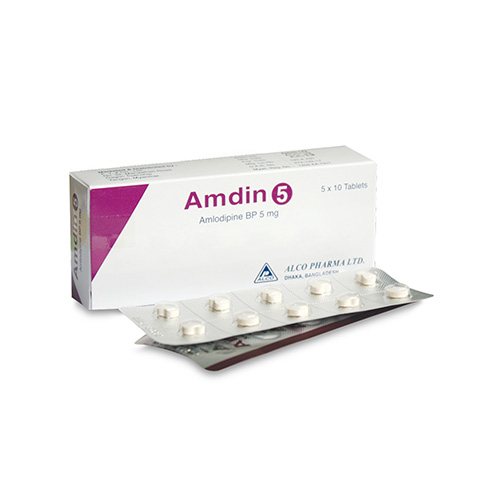
AMDIN-5 Tablet
Therapeutic Class
Calcium Antagonists
Indications
1. Hypertension : Amdin may be used alone or in combination with other antihypertensive agents in hypertension. 2. Chronic Stable Angina : Amdin may be used alone or in combination with other antianginal agents in chronic stable angina. 3. Vasospastic Angina : Amdin is indicated for the treatment of confirmed or suspected vasospastic angina. Amdin may be used as monotherapy or in combination with other antianginal drugs.
Chemical Composition
Amdin-5: Each tablet contains Amlodipine besilate which is equivalent to Amlodipine BP 5 mg
Packaging
5 x 10's/ Box
Dosage & Administration
The usual initial antihypertensive oral dose of Amdin is 5 mg once daily with a maximum dose of 10 mg once daily. Small, fragile or elderly individuals or patient with hepatic insufficiency may be started on 2.5 mg once daily and this dose may be used when adding Amdin to other antihypertensive therapy. Dosage should be adjusted according to each patient's need. The recommended dose for chronic stable or vasospastic angina is 5-10 mg, with the lower dose suggested in the elderly and in patients with hepatic insufficiency. Most patients will require 10 mg for adequate effect. Co-administration with other Antihypertensive and/or Antianginal Drugs : Amdin has been safely administered with thiazides, ACE inhibitors, beta-blockers, long- acting nitrates and/or sublingual nitroglycerin.
Contraindications
It is contraindicated in patients with known hypersensitivity to Amlodipine.
Warning & Precautions
General: Acute hypotension has rarely been reported after oral administration of Amlodipine. Caution should be exercised when administering Amlodipine as with any other peripheral vasodilator particularly in patients with severe aortic stenosis. Use in patients with congestive Heart Failure: in general, all calcium channel blockers should be used with caution in patients with heart failure. Patients With Hepatic Failure: caution should be exercised when administering Amlodipine to patients with severe hepatic impairment. Pediatric Use: Safety and effectiveness of Amlodipine in children have not been established.
Side Effects
In general, treatment with Amlodipine was well-tolerated. Most adverse reaction reported during therapy with Amlodipine were of mild or moderate severity. The most common side effects are headache, nausea, abdominal pain & edema.
Drug Interaction
In vitro data in human plasma indicate that Amlodipine has no effect on the protein binding of drugs tested (digoxin, phenytoin, warfarin and indomethacin). In clinical trials, Amlodipine has been safely administered with thiazide diuretics, beta-blockers, ACE inhibitors, long-acting nitrates, sublingual nitroglycerin, digoxin, warfarin, non-steroidal anti-inflammatory drugs,antibiotics and oral hypoglycemic drugs.

